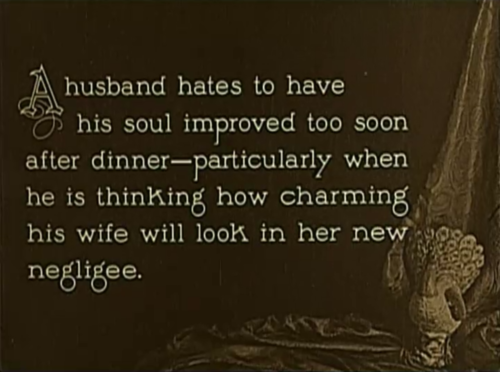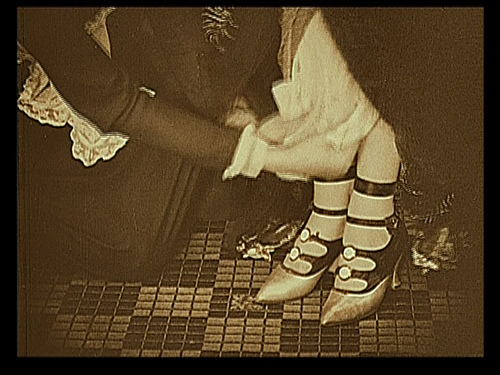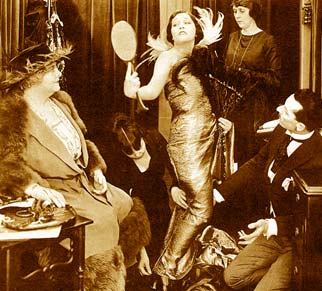Why Change Your Wife? (1920) is a matrimony “comedy” by Cecil B. DeMille. There are two possible responses to a movie like Why Change Your Wife?: mockery and anger. I’ve never been much of a one for laughing at bad movies.
- Helen Geib, Commentary Track
So above goes the opinion of one gal. So here goes the beauty of the American condition: free to agree to disagree. I am thankful, however, that Ms. Geib chose the phrasing of possible responses, for many a critic will oft claim his view as gospel. Thank you, Helen, for leaving open this small crack in the patio door. Like a stray cat, or the Obama family, I shall take this wee opportunity, dash inside and have my way with the furniture until I am shooed from the premises.

Why Change your Wife? is a viable comedy: from Chaplinesque pratfalls to the classical, stage requirements of the theater. Why Change Your Wife? (1921 Famous Players-Lasky Corporation/Paramount Pictures Distribution), directed by Cecil B. DeMille and written by (in alphabetical order) Sada Cowan, William DeMille and Olga Printzlau, offers a glitzy, stocking-and-gartered, Old Hollywood-styled, silent-era film of the alpha relationship. Like a banshee from the turreted rooftops, this sex farce shrieks the foibles of men and women, husbands and wives, whilst whispering from those same turrets those of mother and child. Mother and son, to be more accurate; for, that is what lies at the foundation of this sociological flicker. Shakespearean in its storyline, Freudian in its subtext, this follow-up to DeMille's 1919 Don't Change Your Husband posits, and eventually answers, an common, albeit underlying and queasy quandary ... Do men want to marry their mothers? Though most prefer to build a Home Depot over all that and let it remain buried, there are as many responses to said-quandary as there are men, and mothers.
Synopsis: Robert and Beth Gordon (Thomas Meighan and Gloria Swanson) are married. Period. He heads to work, she stays home. He tries to shave each morning, she hogs the mirror. He likes fox trots, she prefers classical. He loves his dog, she sees walking disease. He likes to dance, she likes to read. He buys her lingerie, she finds it disgusting.
In a moment of concession, Beth tries on the new negligee, just hours earlier modeled in-store by a young nymph named Sally. Beth, unsure of how to rock such gear and Robert, clueless as to how to help her rock it, tries his best. Do you know, somehow in the shop, it looked - thinner. Brilliant, Bob. Brilliant. Still a sport, she tries to get in the mood with the same face and enthusiasm one gives while cleaning hair from a shower drain. Quelle surprise, she just can't do it. You expect me to share your Oriental ideas? Do you want your wife to lure you like a - a - Oh, why didn't you marry a Turk?
Robert should have known better. All of her puritanical tendencies are clearly evident; she wears thick glasses and her hair rolled up. Duh. Beth finds most every habit of Robert's vile: smoking, eating, drinking, dancing, lusting. At every turn she not only lets him know of her disapproval, but she takes the opportunity to educate him and change his boyish charms, certainly the dangerous charms which lured her to him originally. Robert, why will you play that awful, physical music? Try to cultivate your taste, dear! Enter sexy, jazzy Sally.

He likes Sally, Sally likes lingerie and knows exactly how to rock it. Sally likes smoking, jazz, dancing, parties, stockings, feathers, rhinestones, shoes with kitten heels and best of all booze! The outlook is clear and a million, as pilots say. Bob skeezes about with Sally, Beth smells Sally's lurid Persian Nights perfume on Bob one night, Beth files for divorce. Bob is okay with that and quickly weds Sally. Even the dog is happy, for a bit.
The day the divorce is final, Beth's Aunt Kate takes her shopping. Surely a new frock will heal her pain. In a scene right out of Cougartown and with mere curtains for dressing room partitions, the jazzy gals next door overhear Beth's woes, and she their analysis of said-woes. Feeling pity for her, they also conclude she may have brought it on herself, judging she just wouldn't play with her husband and dresses like his aunt, rather than his wife. A sting makes a mark and she realizes perhaps she has become a bit mumsy and let herself go. Nothing like than loosening the hair, losing the glasses and shimmying into some embroidered stockings and a backless, sleeveless, transparent and indecent number to let the world know how Beth got her groove back.
Thank goodness for coincidence, for soon Robert gets a gander of Beth and her smashing, previously unseen gams at a swanky resort. Beth bought the very bathing suit the dressing room gal had tried on that fateful day, recalling the sage words of the shop clerk: If a girl can wear a bathing suit like this - it's her duty to do so! Pity Sally doesn't look as good this day. In fact, as Beth lounges poolside in her scandalous suit and is wooed by a dozen dapper dandelions, Sally has become a drag and a plain old nag. Taken to correcting Bob's posture and manners in public, she doesn't even love his dog anymore. She's hogging the mirror now and, funny enough, the new Mrs. Gordon appears shorter, dumpier and duller than the shiny new ex-Mrs. G. Naturally, Robert notices all of this. The liberated ex and the man-toddler Robert, tired of his new toy, fall in love all over again.
:End Synopsis
Sally frets briefly at the resort breakup. Happily for her though, she spies a yummy new target and cries the battle charge that would do a Real Housewife proud: Remember the Alimony! Beth, for her part, now loves Bob's dog, digs jazz, shows off her junk, pours out the gin, presumably puts out and, like a good girl, probably hates books. She snaps in two her favourite, classical record and to the delight of all, she finally dons that Oriental negligee Robert bought her, pre-divorce, and they merrily direct the maid and valet to not only bring Beth's bed in from the other room, but, hold on to your bippies Rob and Laura Petrie, push those matrimonial beds together.

You may ask, where is the contemporary link here? How is this adaptable and humorous to vous? It's funny alright and it's relative. Just as Shakespeare's sex comedies are apropos today, so go the marriage farces of the silent era and the career girl-loves-slacker dude, Judd Apatow films of today. Plain old human nature; only the negligees and the music have changed. There's a lesson for everyone involved; there's also a realization for many. Some men need a mom for a wife and some men don't. Simple. If your goal is to dust them off and dress them up in a sailor outfit, they'll let you know pretty quickly if that's okay. If they already have a mom and want a wife, they'll let you know that, too. Some men need that structure and guidance; they'd be a train wreck without it. Others direct themselves nicely and need a partner to co-pilot with them. Of course, some want a co-pilot who'll simultaneously spoon-feed and navigate while they fly. Those are probably trickiest for the wife. The others are pretty cut-and-dry. I think the Mr. Gordons of the world may need the rare, gin-swilling mom in a sleeveless, backless, transparent, indecent number.
In the end, women, for it does appear men of the '20s had little to learn, are proffered advice that might be heeded by both husbands and wives. My proffering? Men, make your intentions clear; women, don't change your husband. Live by it, laugh at it or rail against it, it suits all well on some level.
"And now you know what every husband knows: that a man would rather have his wife for his sweetheart than any other woman: but Ladies: if you would be your husband's sweetheart, you simply must learn when to forget that you're his wife."
-Why Change Your Wife? - final intertitle
*************************************************************************************************************************
Wondering who the heck Cecil B. DeMille is? Did you read this and think, "I wasn't born in 1920" and therefore couldn't possibly know about people whom lived when everybody walked really fast in newsreels? (Pet peeve of mine, btw. You really can't know about anything or anyone whom existed before your birth year? I know about Mozart, John Dillinger and Edward the Confessor, but ... ) Anyhoo, if you're still bored at work, allow me to introduce you ...
Cecil B. DeMille, for those of you familiar enough with the name, yet unsure as to whether or not he's that dude in your algebraic topology class who always wears the Andy Capp hat and who constantly smells like weed, or if you think you've seen the name on the end credits of a Chuck episode, allow me to school you real quick.
Briefly, Mr. DeMille (professional spelling, as opposed to de Mille, which he used in his personal life), the son of a Columbia University professor and a girls' school headmistress, made seamless and timely transitions from theater and vaudeville in New York to the sunny climes and silent moving pictures of Hollywood and well into the era of the talkies, Technicolor and television. Earning a Best Picture Oscar in 1953 for The Greatest Show on Earth would be an achievement of note; yet, like Thomas Jefferson, who chose to omit "U.S. President" from his epitaph, Cecil Blount DeMille had more than enough to adorn his symbolic epitaph. Founding partner of Paramount Pictures, founder of the Academy of Motion Picture Arts and Sciences, member of the first Board of Directors for Bank of Italy (later to become Bank of America) and founder of Mercury Aviation, the first commercial airline to offer passenger service on a regular schedule, were all virtually accomplished before Yours Truly changed out of her jim-jams this morning.
Above all, DeMille was of that great hybrid: filmmakers, storytellers, auteurs, visionaries and businessmen. Like Shakespeare, Spielberg, Lucas, Edison (Thomas Edison, being one of the industry's first filmmakers: late-19thC.), Allen and Disney, DeMille knew how to tell a story, show a story, produce a story, monetize a story. In the glorious, if not always ethical, early days of Hollywood and its studio system, all but six of his seventy films turned a profit. Known for Biblical, historical and grand-scale productions, he cemented mainstays like Cleopatra, The Ten Commandments, Samson and Delilah, Reap the Wild Wind and The Warrens of Virginia firmly into the groundwork of west coast filmmaking. Unafraid of success and blissfully unashamed of his achievements (a characteristic curiously and frighteningly frowned-upon in this New World Order of 2011), DeMille, like so many a successful titan of any industry, understood the need to evolve and pioneer ahead into frontier territory. Imagine what he might have done in the era of Bill Gates, Google and Netflix.



